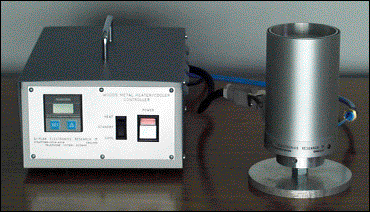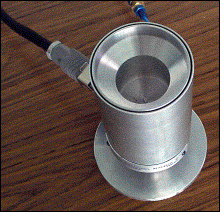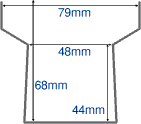|
|
Home
Index
Test machines
Test ancillaries
Measurement
Production
Services
Miscellaneous
|
|
|
Wood's Metal Pot
'Wood's metal' is a term covering mixtures of metals (amalgams)
which typically become liquid in the temperature range 70
to 90 degrees Centigrade and solidify on cooling. This property is
useful in securing objects of unusual shape prior to loading on
a testing machine.
Immerse the first end of the non-standard item in a pot of liquid metal
which secures the item on cooling. The pot itself is
supplied with fixings chosen to match the test machine.
Repeat the process for the second end with a second pot.
The Wood's metal pot designed and built by Si-Plan Electronics
Research liquefies the amalgam in 15 minutes and uses air cooling
to obtain initial solidification in 5 minutes. Two pots are supplied,
one for each end of the specimen.


The Wood's metal pot and controller
- The Wood's metal pot consists of a pot surrounded by a
heating and cooling jacket.
- Heating is electrically powered. Connect to a 230 volt,
2 amp (minimum) electricity supply.
- Cooling is by compressed air. Connect to a compressed air
supply with a pressure not exceeding 8 bar.
- Temperature is controlled by the Wood's metal heater/cooler
controller with a power switch and a three-way toggle switch:
options are HEAT, STANDBY and COOL.
- Maximum temperature is set on the DTC 410 TEMPERATURE CONTROLLER.
(Settings are retained when the power is disconnected.)
- Air is delivered from the controller to the pot through
plastic tubing.
- Power is delivered from the controller to the pot through a
detachable connecting cable.
Applications
The Wood's metal pot is used to secure objects of unusual shape prior to loading on testing machines. A typical application is to prepare artificial limbs for mounting on limb testing machines.
 The larger diameter at the top of the pot is a flood plane to accommodate displaced liquid metal. In the unit illustrated above the diameter of the
lower part of the pot is 48mm, with a depth of 44mm; the maximum diameter of the flood plane is 79mm. The maximum pot depth is 68mm. This size is typically satisfactory for specimen loading up to 500kg. The larger diameter at the top of the pot is a flood plane to accommodate displaced liquid metal. In the unit illustrated above the diameter of the
lower part of the pot is 48mm, with a depth of 44mm; the maximum diameter of the flood plane is 79mm. The maximum pot depth is 68mm. This size is typically satisfactory for specimen loading up to 500kg.
Pots can be manufactured in a variety of sizes to accommodate specimen dimensions and loading specified in test regimes, with fixings to match the test machine.
Using the Wood's metal pot
- To embed a sample: screw the thread on the bottom of the Wood's metal pot into the fixing jig on the actuator of the test machine (Attach the pot to the test rig in an upright position.)
- Connect the power lead and air pipe between the Wood's metal heater/cooler controller and the Wood's metal pot.
- Attach the heater/cooler controller to a compressed air supply delivering not more than 8 bar.
- Ensure that the pot holds the correct quantity of metal amalgam to secure the test piece. Fill to the level of the small diameter.
- Plug the controller into a 230 volt electricity supply.
- Set the chosen target temperature on the controller.
- Set the switch on the controller to HEAT. The temperature rise will be
displayed. The metal alloy will be liquid in about 15 minutes.
- When the metal amalgam is fully liquid, insert the end of the test piece to be secured. It is possible that the metal amalgam will solidify immediately on the surface of the test piece, depending on its thermal mass and temperature. This can result in poor adhesion. To avoid this possibility, carefully agitate the test piece in the hot metal until the metal runs off the test piece when it is raised above the pot.
- Secure the test piece firmly in the desired position and switch the three-way toggle switch on the controller to COOL. When the metal alloy has cooled and solidified, remove the air tube and power supply. Remove the sample and pot from the actuator.
- Invert the specimen and repeat the process for the other end of the test piece.
To secure for cooling, fit the solidified end and pot to the cross head.
- Allow the second pot to cool and solidify. Remove the air tube and power supply from the pot before commencing the test.
Updated 20 April 2005
|


 The larger diameter at the top of the pot is a flood plane to accommodate displaced liquid metal. In the unit illustrated above the diameter of the
lower part of the pot is 48mm, with a depth of 44mm; the maximum diameter of the flood plane is 79mm. The maximum pot depth is 68mm. This size is typically satisfactory for specimen loading up to 500kg.
The larger diameter at the top of the pot is a flood plane to accommodate displaced liquid metal. In the unit illustrated above the diameter of the
lower part of the pot is 48mm, with a depth of 44mm; the maximum diameter of the flood plane is 79mm. The maximum pot depth is 68mm. This size is typically satisfactory for specimen loading up to 500kg.
